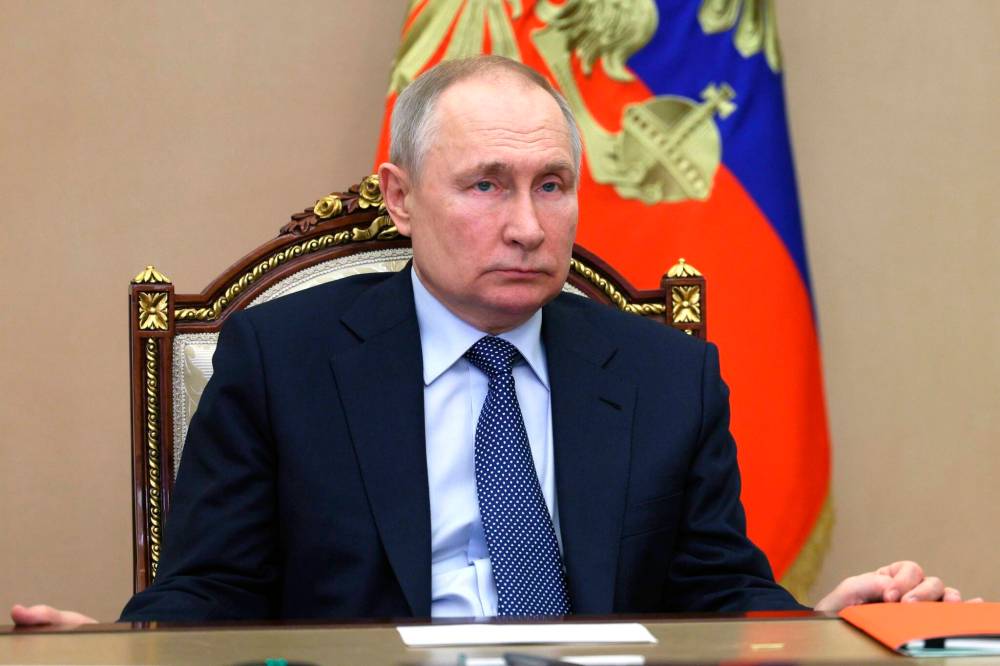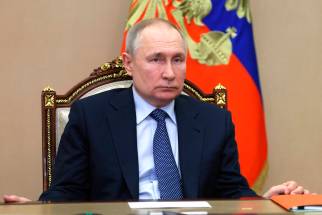Higher oil prices won’t help Putin in the long run
Read this article for free:
or
Already have an account? Log in here »
To continue reading, please subscribe:
Monthly Digital Subscription
$0 for the first 4 weeks*
- Enjoy unlimited reading on winnipegfreepress.com
- Read the E-Edition, our digital replica newspaper
- Access News Break, our award-winning app
- Play interactive puzzles
*No charge for 4 weeks then price increases to the regular rate of $19.00 plus GST every four weeks. Offer available to new and qualified returning subscribers only. Cancel any time.
Monthly Digital Subscription
$4.75/week*
- Enjoy unlimited reading on winnipegfreepress.com
- Read the E-Edition, our digital replica newspaper
- Access News Break, our award-winning app
- Play interactive puzzles
*Billed as $19 plus GST every four weeks. Cancel any time.
To continue reading, please subscribe:
Add Free Press access to your Brandon Sun subscription for only an additional
$1 for the first 4 weeks*
*Your next subscription payment will increase by $1.00 and you will be charged $16.99 plus GST for four weeks. After four weeks, your payment will increase to $23.99 plus GST every four weeks.
Read unlimited articles for free today:
or
Already have an account? Log in here »
Hey there, time traveller!
This article was published 03/04/2023 (970 days ago), so information in it may no longer be current.
World oil prices shot up about six per cent yesterday after Russia, Saudi Arabia and their oil cartel partners announced a sharp cutback in production. The price rise will benefit oil producers, hurt consumers and perhaps help Russia finance its invasion of neighbouring Ukraine.
Russia’s oil revenues have been declining this year since the western industrial countries of the Group of Seven set a price cap of US$60 a barrel on oil purchased from Russia. The International Energy Agency, an oil importers’ body, estimated in March that Russia’s oil export revenues had fallen to $11.6 billion in February, down $2.7 billion from January. Western-imposed bans on Russian oil — together with the price cap — caused the decline.
Aside from Russia’s need for a higher oil price, Saudi Arabia has been arguing that an imminent world recession will reduce demand for oil. A production cut was needed, Saudi authorities reasoned, to maintain a balance of supply and demand and maintain oil market stability.
Alexei Babushkin/Sputnik/Kremlin Pool Photo Russian President Vladimir Putin 
The price increase, however, will tend to drive up consumer prices for oil and oil products, adding to the prevailing inflation and helping bring on the recession that western central banks have been hoping to avoid.
For oil-producing countries such as Canada, the price increase will boost government tax revenues and the sales revenues of oil-producing companies. Motorists and oil-consuming industries will feel the effects from the other side as the price increases work their way through the system from producers to refiners to retailers.
Higher retail gasoline prices, piled on top of the federal government’s carbon tax, may encourage consumers to look more carefully at battery-powered vehicles and get rid of old gas-guzzlers. More broadly, the Russian-Saudi move may support de-carbonization of the industrial economies as a way of avoiding price dictation by the producing countries.
The price increase, however, will tend to drive up consumer prices for oil and oil products, adding to the prevailing inflation and helping bring on the recession that western central banks have been hoping to avoid.
Politically, the production cutback dramatizes the dependence of Canada and other industrial countries on the whims of Russian President Vladimir Putin, Saudi Crown Prince Mohammed bin Salman and other oil-producing autocrats who see the western industrial countries not as customers to be served but as adversaries to be weakened and exploited.
While Canada, the United States and western Europe continue to import oil, they will continue to live at the mercy of Mr. Putin, Mr. bin Salman and the rest of the OPEC cartel. Cutting back dependence on imported oil will not be easy, but the OPEC price-fixers are helping us down that road.
Western intelligence agencies have been trying to estimate how much longer Mr. Putin can continue his war in Ukraine with an unwilling army, dwindling supplies of weapons and declining oil export revenue. The OPEC production cutback and resulting price increase will not necessarily strengthen him: declining sales at an increased price may leave him in much the same position as before.
The OPEC production cutback and resulting price increase will not necessarily strengthen him (Putin): declining sales at an increased price may leave him in much the same position as before.
Member countries of the North Atlantic Treaty Organization, who are supporting Ukraine’s resistance to Russian aggression, should welcome the OPEC production cutback. The sooner Canadian industries and consumers learn to live with a lower level of oil consumption, the sooner we will be able to laugh at Putin’s efforts to punish us at the gas pump.
The longer the current glut of oil continues, the longer the industrial countries will keep pouring greenhouse gas emissions into the atmosphere and the sooner we will reach the threshold of irreversible damage to Earth’s climate and food production. We may eventually have Vladimir Putin to thank for shaking us out of greenhouse gas complacency.













